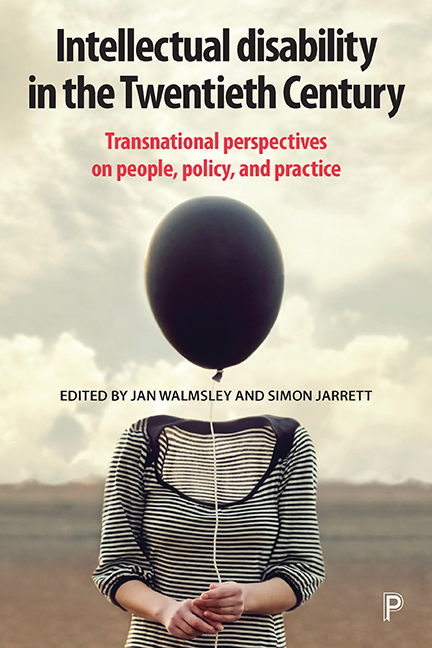 Intellectual Disability in the Twentieth Century
Intellectual Disability in the Twentieth Century Book contents
- Frontmatter
- Contents
- Notes on editors and contributors
- Introduction
- one Paradoxical lives: intellectual disability policy and practice in twentieth-century Australia
- two Tracing the historical and ideological roots of services for people with intellectual disabilities in Austria
- three Time of paradoxes: what the twentieth century was like for people with intellectual disabilities living in Czechoslovakia/Czech Republic
- four Intellectual disability in twentieth-century Ghana
- five A Greek Neverland: the history of the Leros asylums’ inmates with intellectual disability (1958–95)
- six Intellectual disability in Hong Kong: then and now
- seven People with intellectual disabilities in the European semi-periphery: the case of Hungary
- eight People with intellectual disabilities in Iceland in the twentieth century: sterilisation, social role valorisation and ‘normal life’
- nine Institutionalisation in twentieth-century New Zealand
- ten ‘My life in the institution’ and ‘My life in the community’: policies and practice in Taiwan
- eleven Intellectual disability policy and practice in twentieth-century United Kingdom
- twelve From social menace to unfulfilled promise: the evolution of policy and practice towards people with intellectual disabilities in the United States
- Index
nine - Institutionalisation in twentieth-century New Zealand
Published online by Cambridge University Press: 27 April 2022
- Frontmatter
- Contents
- Notes on editors and contributors
- Introduction
- one Paradoxical lives: intellectual disability policy and practice in twentieth-century Australia
- two Tracing the historical and ideological roots of services for people with intellectual disabilities in Austria
- three Time of paradoxes: what the twentieth century was like for people with intellectual disabilities living in Czechoslovakia/Czech Republic
- four Intellectual disability in twentieth-century Ghana
- five A Greek Neverland: the history of the Leros asylums’ inmates with intellectual disability (1958–95)
- six Intellectual disability in Hong Kong: then and now
- seven People with intellectual disabilities in the European semi-periphery: the case of Hungary
- eight People with intellectual disabilities in Iceland in the twentieth century: sterilisation, social role valorisation and ‘normal life’
- nine Institutionalisation in twentieth-century New Zealand
- ten ‘My life in the institution’ and ‘My life in the community’: policies and practice in Taiwan
- eleven Intellectual disability policy and practice in twentieth-century United Kingdom
- twelve From social menace to unfulfilled promise: the evolution of policy and practice towards people with intellectual disabilities in the United States
- Index
Summary
“We see life within a family as a fundamental right for children as well as the best option. We see no place for children in institutions solely on the grounds of intellectual disability and believe that the appropriate assistance in the home will help to sustain the family. This will also be less costly to the State.”
Craig et al, 1991, 22
“E rere ki a puawai, e tipu ki a puwai, huia ka puwai.”
[“As the water flows and the new buds of the forest arrive: So there is growth.”]
Catherine Colebourne and the Waikato Mental Health History Group, 2012, 146
Introduction
This chapter focuses on the impact of processes of institutionalisation and deinstitutionalisation on the lives of people with learning/intellectual disabilities in twentieth-century New Zealand. Knowledge about what happened during this period has been slow to emerge, in part due to widespread acceptance within New Zealand society of the idea of ‘out of sight, out of mind’ that surrounded the notion of (intellectual) disability at this time. Later on, the desire for families and communities to move on from institutional practices meant that talk about what had happened was not encouraged. Further, many who had been employed in institutions had signed Declarations of Fidelity that promoted a code of silence about the nature of their work. Gathering information about the experiences of the people themselves has been difficult (Catherine Colebourne and the Waikato Mental Health History Group, 2012, 227–9). However, the two decades since 2000 have seen a growth in material about this still sensitive area of New Zealand's social history. Records about individual patients have been archived and made available to the public. Personal stories are also accessible in a variety of on-line and text formats. As Craig et al (1991) suggest, the twentieth century saw a consolidation of the right of all intellectually disabled people to live within family and community groups and to access the support needed to do so. Yet to what degree the state actively supported deinstitutionalisation as a means of defraying costs rather than upholding rights is a question that remains open. I return to this at the end of the chapter.
- Type
- Chapter
- Information
- Intellectual Disability in the Twentieth CenturyTransnational Perspectives on People, Policy, and Practice, pp. 143 - 164Publisher: Bristol University PressPrint publication year: 2019
